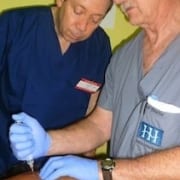When we think about our overall health, we very rarely consider our joints. Yet the human body has over 200 joints that work in tandem to give us the ability to walk, run, jump, and move around with ease. But when arthritis strikes, some of these simple movements become difficult to carry out.
Arthritis is an inflammation of the joints that can lead to pain, stiffness, and tenderness. It is a condition experienced by millions of Americans and is the number one cause of disability nationwide. There are two main types of arthritis: osteoarthritis, when the joints experience natural wear and tear as we get older, and rheumatoid arthritis, an autoimmune condition in which the body attacks its own joints. With any type of arthritis, the wear and tear become excessive and the cartilage that supports our bones and joints starts to weaken and disintegrate. This results in joint pain that causes tenderness, stiffness, and difficulty moving.
Management options for arthritis
When treating arthritis or any other inflammatory condition, the first step is figuring out what is causing the inflammation. Without looking for the underlying cause, efforts to heal or ease symptoms may be unnecessarily prolonged or ineffective. To do this, we look at all the major areas of health for imbalances and/or deficiencies that need to be corrected. This is called a Functional Medicine Assessment. Once the assessment is complete, a treatment plan that includes traditional and alternative therapies is usually recommended.
Alternative therapies are any non-traditional treatments. They benefit from having fewer side effects and tend to be good for other aspects of your health as well. Depending on the severity of your symptoms, alternative therapies can be used in conjunction with or as an alternative to many traditional medical treatments. The following treatments might be used as part of your management regime.
Anti-inflammatory diet
Making dietary changes to improve the digestive tract is one of the first and most important steps in managing symptoms. An unhealthy digestive tract can result in nutritional deficiencies and allows foreign “invaders” like toxins and bacteria to enter the circulatory system and cause inflammation. Our nutritionist can create an anti-inflammatory diet specific to your health profile for improved gut and immune health.
Osteopathic Manual Therapy (OMT)
OMT can ease arthritis symptoms by using gentle pressure and movement to stretch muscle, soft tissue, and joints for proper alignment, increased blood flow, and improved mobility.
Acupuncture
Research shows that acupuncture can help control inflammation and swelling. Acupuncture also releases pain-relieving chemicals in the body called endorphins which not only help with pain but promote relaxation and overall wellbeing.
Joint-specific supplements
Supplements, such as Glucosamine, Chondroitin, Fish oil, Turmeric, and Ginger, are known to help ease arthritic pain. As with any medication or supplement, speak to your doctor first before starting them.
PIT is an advanced injection therapy that heals inflamed or painful nerves resulting from chronic, non-malignant issues. It involves injecting a low concentration dextrose solution (a naturally occurring sugar in the body) with a pH similar to the body’s natural level next to the injured subcutaneous (below the skin) nerves with the goal of neutralizing the existing inflammation. The dextrose solution helps reduce inflammation and in turn, restores the cells’ ability to signal and function properly. Patients see an almost immediate improvement in pain symptoms.
Minerals and vitamins
Boost your bone health by giving them all the nutrients and minerals they need. Consider Calcium, Vitamin D, and Magnesium. A diet that is rich in these minerals will help keep your bones strong, healthy, and mobile. Additionally, it can also lower your risk of osteoporosis.
The body was made to move. Keep active as much as possible even if it’s just walking once or twice a week. Focus on exercises that increase joint strength. This includes:
- Weight-training to build up joint strength.
- Low-impact cardio exercises like stationary biking, yoga, or tai chi.
- Take steps to maintain a healthy body weight. Every extra pound of weight you carry puts additional stress on your joints.
Hydrotherapy
Hydrotherapy or aquatic therapy is just movement of the body in a pool of water. This form of activity can be a really important tool in managing arthritis. Moving around in water gently strengthens your muscles while the buoyancy of the water also takes weight off painful joints. It is a great way to strengthen the muscles while also minimizing the resistance against them. Most aquatic centers offer classes on a 1-1 basis or as group sessions. Additionally, hydrotherapy is a fun and social activity.
Over the counter (OTC) medications
Acetaminophen (Tylenol), Ibuprofen and other NSAIDs are often used to help with the management of arthritis. However, it’s important to remember that while these medications may help alleviate pain in the short term, they do nothing to address the underlying condition. Additionally, when taken over an extended period, NSAIDs can increase your risk of other serious health conditions such as GI bleeds, renal disease, heart attack and stroke and may have serious interactions with other medications. Too much acetaminophen can lead to liver disease. Talk to your physician about proper dosage before using any OTC medications to manage your symptoms.
Additional References
https://www.cdc.gov/chronicdisease/resources/publications/factsheets/arthritis.htm#
https://www.arthritis.org/health-wellness/treatment/complementary-therapies/natural-therapies/acupuncture-for-arthritis
https://arthritis.ca/living-well/2018/water-therapy-and-arthritis
https://www.arthritis.org/health-wellness/treatment/complementary-therapies/supplements-and-vitamins/vitamins-supplements-arthritis
https://www.ncbi.nlm.nih.gov/pmc/articles/PMC3665023/




